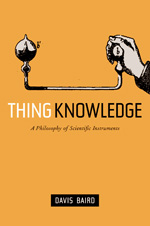【英語で読む!講座】 Thing Knowledge (物のかたちをした知識) その1
Imagined World (科学の未来)に引き続き、新しい観点の科学哲学の本を取り上げることにしたい。
今回紹介したいのは、科学的な知識というものは、理論のなかだけにあるのではなく、物のなかにもあると主張する Davis Baird の Thing Knowledge という本だ。ふつう、知識というものは、形式的なものであれ、暗黙的なものであれ、「物」ではないと考える。というよりも、そもそも知識が物というかたちをとっているという発想はない。
という本だ。ふつう、知識というものは、形式的なものであれ、暗黙的なものであれ、「物」ではないと考える。というよりも、そもそも知識が物というかたちをとっているという発想はない。
Bairdは、この本で、物が体現する知識というものに着目し、その視点の重要性を唱える。科学的な装置は、単に理論を生み出す補助的な道具なのではなく、そのものが知識だというわけである。
この新しい知識論は、概念・方法・道具という軸で研究する僕にとっては、かなり重要な視点となる。具体的にいうと、「思考の道具」としてのシミュレーションモデルとは何か、ということを真に理解するためにも、この"Thing Knowledge"という考え方は重要なのだ。

 Davis Baird, Thing Knowledge; A Philosophy of Scientific Instruments
Davis Baird, Thing Knowledge; A Philosophy of Scientific Instruments , University of California Press, 2004
, University of California Press, 2004
邦訳は、『物のかたちをした知識:実験機器の哲学』 (デービス・ベアード, 松浦 俊輔 (訳), 青土社, 2005
(デービス・ベアード, 松浦 俊輔 (訳), 青土社, 2005
まず、この本の基本的な視点は、以下の一文に集約される。
"constitute"は、この本でよく出てくるのだが、「~を構成する」の意味。類義語である"compose"や"comprise"、"consist"に比べ、抽象的なものを構成するときに使われるという。
この"Things and theory can both constitute our knowledge of the world."って、かっこいい表現だと思う。
さて、この本の目的は、以下のとおり。
この本では、従来の言語的な知識論 ("language-centered understanding of knowledge") に対し、実物論的認識論 (materialist epistemology) を打ち立てることが目指されている。
"epistemology"は、「認識論」(エピステモロジー)。知識の理論や科学哲学ともほぼ同義で使われるが、認識の起源や本質、諸形式について論ずる哲学の一部門である。知識や学問について語るときには、認識論的な考察は避けられない。ニクラス・ルーマンも、『社会システム理論』の最終章に「認識論にとっての諸帰結」という章を設けて、「認識論のシステム論的展開」ということを語っている。
"materialist epistemology"の"materialist"は、"materialism"の立場(の人)という意味だが、ここは少し注意が必要だ。"materialism"は、分野によって、物質こそが真に存在するものだとする「唯物論」や、 宗教や超自然的な解釈を排除する「実質主義」、「実物主義」、「実利主義」など、いろいろな意味があるからだ。ここでは、「唯物論」や「実質主義」というような物に極端に偏る強い意味ではなく、「言葉」に対する「物」という点を強調して使われている、と捉えるべきだろう。このことは、「理論」と「物」の両方が知識である、と主張していることからもわかる。
"instruments"は、「器具」、「器械」、「道具」、「楽器」などの意味があるが、道具のなかでも精密なものを指す場合が多い。"instrumental"は、「助けになる」、「手段になる」という意味。
"on (a) par (with)"は、「同様で」、「同等で」という意味だそうだ。
話を本の内容に戻そう。「物のかたちをした知識」も知識として捉える認識論は、従来の認識論の枠組みのなかに位置づけることができないが、科学と技術の関係を考えるうえで重要だという。
たしかに、このような新しい認識論は、「理論」が純粋な科学の産物であり、「物」は応用科学的なもの、もしくは工学的なものであるという見方を変えるだろう。知識創造ということを、矮小化して捉えないためにも、この本で提案されている考え方は重要だと思う。
次回も引き続き、この本を取り上げたいと思う。次に取り上げるのは、この本で最初に事例として取り上げられているマイケル・ファラデーの器具についてである。
今回紹介したいのは、科学的な知識というものは、理論のなかだけにあるのではなく、物のなかにもあると主張する Davis Baird の Thing Knowledge
Bairdは、この本で、物が体現する知識というものに着目し、その視点の重要性を唱える。科学的な装置は、単に理論を生み出す補助的な道具なのではなく、そのものが知識だというわけである。
この新しい知識論は、概念・方法・道具という軸で研究する僕にとっては、かなり重要な視点となる。具体的にいうと、「思考の道具」としてのシミュレーションモデルとは何か、ということを真に理解するためにも、この"Thing Knowledge"という考え方は重要なのだ。

邦訳は、『物のかたちをした知識:実験機器の哲学』
まず、この本の基本的な視点は、以下の一文に集約される。
"Things and theory can both constitute our knowledge of the world."(p.12)
「物と理論は、いずれもわれわれの世界に関する知識を構成しうる。」(邦訳 p.37)
"constitute"は、この本でよく出てくるのだが、「~を構成する」の意味。類義語である"compose"や"comprise"、"consist"に比べ、抽象的なものを構成するときに使われるという。
この"Things and theory can both constitute our knowledge of the world."って、かっこいい表現だと思う。
さて、この本の目的は、以下のとおり。
"In this book I aim to contribute techniques for understanding the material products of technology and science. I do so by articulating a materialist epistemology for instrumentation. I argue for a material counterpart to our language-centered understanding of knowledge. Instruments, on par with theory, bear knowledge. Instruments are not in the intellectual basement; they occupy the same floor as our greatest theoretical contributions to understanding the world."(p.xvii)
「本書で私がねらっているのは、技術と科学の物質的な産物を理解するための技法を提供することだ。それを機器使用のための実物論的(マテリアリスト)認識論を立てることで行なう。われわれの言語中心の知識理解に相当する、物による(マテリアル)理解の側に立って論じて行く。機器も、理論と並んで、知識を担っている。機器は知の土台ではない。世界の理解に対する最大の理論的貢献と同じ階を占めているのだ。」(邦訳 p.16)
"Knowledge has been understood to be an affair of the mind. To know is to think, and in particular, to think thoughts expressible in words. Nonverbal creations --- from diagrams to densitometers --- are excluded as merely "instrumental"; they are pragmatic crutches that help thinking --- in the form of theory construction and interpretation. In this book I urge a different view. I argue for a materialist conception of knowledge. Along with theories, the material products of science and technology constitute knowledge. "(p.1)
「知識とは頭の中のものだと理解されてきた。知とは考えることであり、とりわけ、言葉に表現できることを考えることだ。非言語的な産物------図解から光学濃度計まで------は、単なる「機器による補助(インスツルメンタル)」として除かれる。その類のものは、思考------構築された理論や解釈の形の------を助ける実用的な支柱だ。本書で私は、それとは違う見方を説く。知識の実物論的(マテリアリスト)なとらえ方を唱える。理論だけでなく、科学や技術の物質的な産物も知識を構成するのだ。」(邦訳 p.23)
この本では、従来の言語的な知識論 ("language-centered understanding of knowledge") に対し、実物論的認識論 (materialist epistemology) を打ち立てることが目指されている。
"epistemology"は、「認識論」(エピステモロジー)。知識の理論や科学哲学ともほぼ同義で使われるが、認識の起源や本質、諸形式について論ずる哲学の一部門である。知識や学問について語るときには、認識論的な考察は避けられない。ニクラス・ルーマンも、『社会システム理論』の最終章に「認識論にとっての諸帰結」という章を設けて、「認識論のシステム論的展開」ということを語っている。
"materialist epistemology"の"materialist"は、"materialism"の立場(の人)という意味だが、ここは少し注意が必要だ。"materialism"は、分野によって、物質こそが真に存在するものだとする「唯物論」や、 宗教や超自然的な解釈を排除する「実質主義」、「実物主義」、「実利主義」など、いろいろな意味があるからだ。ここでは、「唯物論」や「実質主義」というような物に極端に偏る強い意味ではなく、「言葉」に対する「物」という点を強調して使われている、と捉えるべきだろう。このことは、「理論」と「物」の両方が知識である、と主張していることからもわかる。
"instruments"は、「器具」、「器械」、「道具」、「楽器」などの意味があるが、道具のなかでも精密なものを指す場合が多い。"instrumental"は、「助けになる」、「手段になる」という意味。
"on (a) par (with)"は、「同様で」、「同等で」という意味だそうだ。
話を本の内容に戻そう。「物のかたちをした知識」も知識として捉える認識論は、従来の認識論の枠組みのなかに位置づけることができないが、科学と技術の関係を考えるうえで重要だという。
"The kind of epistemology that I advocate here brings out relationships that, while of recognized importance, have not found a comfortable place in the philosophy of science and technology."(p.17)
「私がここで唱えるような認識論は、重要性は認識されてはいるが、科学と技術の哲学に収まりのいい場所を、まだ見いだしていない。」(邦訳 p.46)
"The most immediate consequence of recognizing instruments as knowledge is that the boundary between science and technology changes. Recent science studies scholarship has recognized a more fluid relationship between science and technology than earlier positivist and postpositivist philosophy of science. Still, it is to theoretical science that one turns to examine knowledge. Previously ignored contributions of craftsmen and engineers are now understood to have provided important, and in many cases essential, contributions to the growth of scientific knowledge. But it is theory that is seen to be growing."(p.18)
「機器を知識として認識することから直ちに導かれる帰結は、科学と技術の境が変わるということだ。近年の科学研究の学者は、科学と技術の間に、かつての実証主義やポスト実証主義の科学哲学よりも、もっと流動的な関係があることを認識している。それでも、知識の検討のために目を向けるのは、理論的な科学だ。以前は無視されていた職人や技術者の寄与は、重要で、多くの事例では必須の寄与を、科学知識の成長に与えてきたと理解されている。しかし成長するのは理論らしい。」(邦訳 p.46)
"The picture I offer here is different. I see developments of things and of theory as being on a par. In many cases, they interact, sometimes with beneficial results all around, but in many cases, too, they develop independently, again sometimes with beneficial results. Work done in industry, putting together bits of the material world, is as constitutive of knowledge as work done by `theoretical scientists.'"(p.18)
「本書で私が出す構図は違う。物と理論の発達を同列に見る。多くの場合、両者は相互作用し、時には有益な結果をもたらすが、それぞれ別個に発達し、やはり有益な結果を伴う場合も多い。産業でなされる研究は、物の世界の部分とまとめられ、「理論科学者」によってなされる仕事と同じく、知識を構成している。」(邦訳 p.46)
たしかに、このような新しい認識論は、「理論」が純粋な科学の産物であり、「物」は応用科学的なもの、もしくは工学的なものであるという見方を変えるだろう。知識創造ということを、矮小化して捉えないためにも、この本で提案されている考え方は重要だと思う。
次回も引き続き、この本を取り上げたいと思う。次に取り上げるのは、この本で最初に事例として取り上げられているマイケル・ファラデーの器具についてである。
英語漬け生活 | - | -